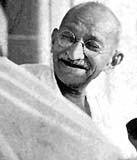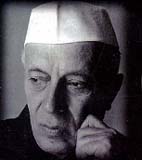Commentary / Mani Shankar Aiyar
Why have we Indians ceased to be proud of being Indians?
 I also had the good fortune of serving on Parliament's standing
committee on HRD, which examined in detail the Bill for establishing
the Maulana Azad Urdu university. I had rather hoped the inauguration
of that university could be a high point of the celebrations,
but as the Bill is still waiting to be even introduced, I doubt
that the university will be in place before 15 August, 1997, is
upon us.
I also had the good fortune of serving on Parliament's standing
committee on HRD, which examined in detail the Bill for establishing
the Maulana Azad Urdu university. I had rather hoped the inauguration
of that university could be a high point of the celebrations,
but as the Bill is still waiting to be even introduced, I doubt
that the university will be in place before 15 August, 1997, is
upon us.
Like the suggestions outlined here, I am certain there must have
been scores of other ideas, more imaginative and more practical,
that must have flowed in. Despite the national mood, we could
have organised a fitting tribute to 50 years of freedom. When
we were in office, we didn't; I cannot see how the Deve Gowda
government's late start can get us beyond tokenism.
Why have we Indians ceased to be proud of being Indians? Why have
we ceased to be proud of India? Why does half-a-century of freedom
mean so little to us?
Of course, we are a nation on the downswing -- no doubt about
that. We have conquered famine but, beyond that, we have made
little dent on poverty. There is an enormous middle class but
his midle class of other countries, especially those of South-East
and East Asia which came to freedom after us, and there is then
despair at the paucity of our achievement rather than pride at
our having taken this middle class exponentially to ten or more
times the size we inherited at Independence.
 But more, perhaps,
than our failures on the development front, it is the turpitude
of our public life that has induced this sense of haunting failure.
We associate our politics not with the remarkable freedom it has
given the Citizen but the corroding corruption of every institution
of governance.
But more, perhaps,
than our failures on the development front, it is the turpitude
of our public life that has induced this sense of haunting failure.
We associate our politics not with the remarkable freedom it has
given the Citizen but the corroding corruption of every institution
of governance.
Where at Independence, and for many years thereafter, the moral
high ground appeared to be the natural monopoly of the Mahatma's
India, the moral tone rings shrilly false today. And where as
a nation we had learned from Gandhiji to set our own standards,
we have in the last few years quite lost our capacity to determine
for ourselves where we want to go and how to get there. Almost
by definition, we must necessarily fall behind the standards that
other set for us.
 We have lost the coordinates which determined the strategy of
our nation-building. From the great moral, historical and political
abstractions of Gandhi and Nehru, we have, in the name of pragmatism,
departed from ideology. We are seeking consciously to become a
nation of pragmatists. The immediate and the expedient, rather
than the principled and the long term, is becoming the drum beat
to which the new India marches. Pragmatism, as a way of life,
soon leads to a loss of focus, a dimming of vision. It is this
psychological and spiritual price we are paying for elevating
material rewards to the status of touchstone of failure and success.
We have lost the coordinates which determined the strategy of
our nation-building. From the great moral, historical and political
abstractions of Gandhi and Nehru, we have, in the name of pragmatism,
departed from ideology. We are seeking consciously to become a
nation of pragmatists. The immediate and the expedient, rather
than the principled and the long term, is becoming the drum beat
to which the new India marches. Pragmatism, as a way of life,
soon leads to a loss of focus, a dimming of vision. It is this
psychological and spiritual price we are paying for elevating
material rewards to the status of touchstone of failure and success.
Such a nation can celebrate the opening of the 50th branch of
McDonalds, not the 50th anniversary of Independence. That, I
suspect, is why no one cares a damn that 50 years ago, India woke
to life and liberty.
|





 I also had the good fortune of serving on Parliament's standing
committee on HRD, which examined in detail the Bill for establishing
the Maulana Azad Urdu university. I had rather hoped the inauguration
of that university could be a high point of the celebrations,
but as the Bill is still waiting to be even introduced, I doubt
that the university will be in place before 15 August, 1997, is
upon us.
I also had the good fortune of serving on Parliament's standing
committee on HRD, which examined in detail the Bill for establishing
the Maulana Azad Urdu university. I had rather hoped the inauguration
of that university could be a high point of the celebrations,
but as the Bill is still waiting to be even introduced, I doubt
that the university will be in place before 15 August, 1997, is
upon us.
 But more, perhaps,
than our failures on the development front, it is the turpitude
of our public life that has induced this sense of haunting failure.
We associate our politics not with the remarkable freedom it has
given the Citizen but the corroding corruption of every institution
of governance.
But more, perhaps,
than our failures on the development front, it is the turpitude
of our public life that has induced this sense of haunting failure.
We associate our politics not with the remarkable freedom it has
given the Citizen but the corroding corruption of every institution
of governance.
 We have lost the coordinates which determined the strategy of
our nation-building. From the great moral, historical and political
abstractions of Gandhi and Nehru, we have, in the name of pragmatism,
departed from ideology. We are seeking consciously to become a
nation of pragmatists. The immediate and the expedient, rather
than the principled and the long term, is becoming the drum beat
to which the new India marches. Pragmatism, as a way of life,
soon leads to a loss of focus, a dimming of vision. It is this
psychological and spiritual price we are paying for elevating
material rewards to the status of touchstone of failure and success.
We have lost the coordinates which determined the strategy of
our nation-building. From the great moral, historical and political
abstractions of Gandhi and Nehru, we have, in the name of pragmatism,
departed from ideology. We are seeking consciously to become a
nation of pragmatists. The immediate and the expedient, rather
than the principled and the long term, is becoming the drum beat
to which the new India marches. Pragmatism, as a way of life,
soon leads to a loss of focus, a dimming of vision. It is this
psychological and spiritual price we are paying for elevating
material rewards to the status of touchstone of failure and success.